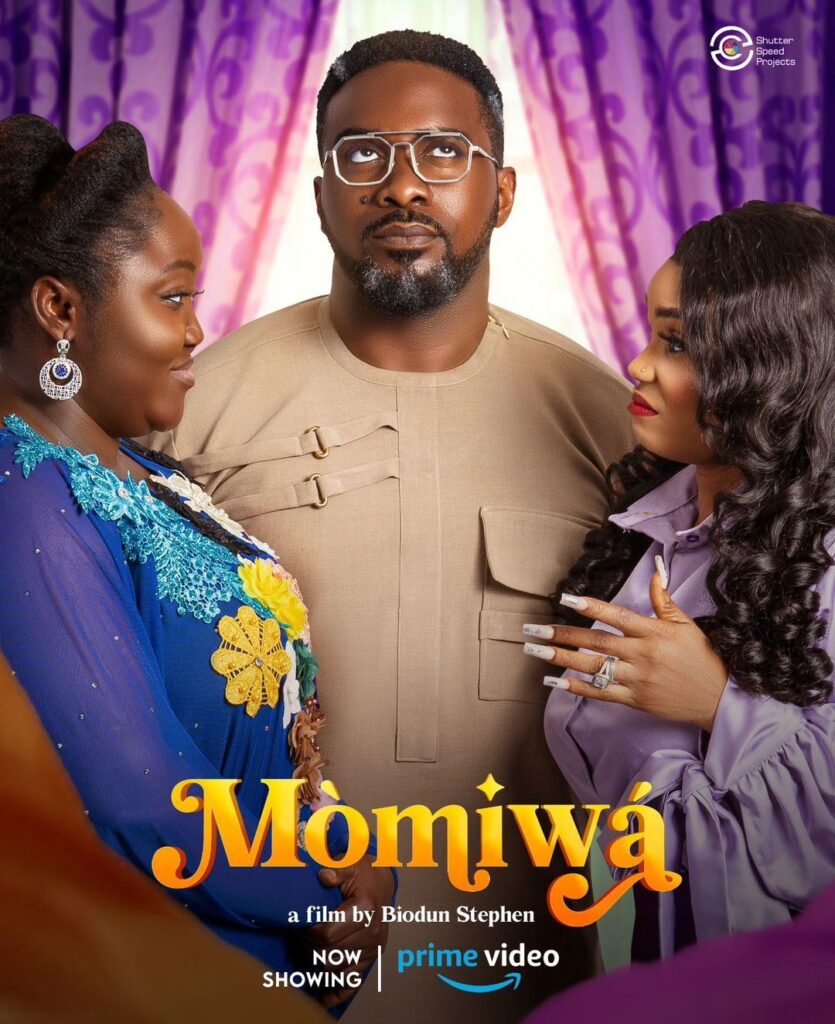Biodun Stephen makes another intriguing directorial statement with her latest release, Momiwa. The director has developed a filmography known for portraying the ties of family and relationships. Her strength as a filmmaker in Momiwa shines through her ability to use the titular character as the core that establishes the entire film albeit to mixed results.

Momiwa tells the story of a family bonded by mutual affection and shared trauma. Naeto (Uzor Arukwe) is a single father who has to raise his children alone when his wife leaves him during financial misfortunes. Luckily for him, Momiwa, also known as Chinonso (Blessing Jessica Obasi-Nze), comes into his life as a guardian angel and supports him until he gets back on his feet. Together, they create a unique family situation and make the most of the cards dealt to them. Life becomes beautiful again for the clan until their quiet, comfortable life is interrupted by the re-entry of Naeto’s ex-wife and biological mother to his children, Kiki (Iyabo Ojo). At first, Naeto wants nothing to do with her, driven by his anger and hatred. Momiwa intervenes, taking pity on Kiki, and convinces Naeto to give her a chance. He eventually softens up to the idea, allowing Kiki back into their lives. For a while, everyone is happy. However, Kiki realizes just how valuable Momiwa has become to her husband and children in her absence and sparks start to fly in the household.
Momiwa is a bucket of nostalgia poured over viewers without restraint. It employs all of the tropes in a classic Nollywood family drama: a young man falls on hard times and is deserted by a woman who seemed to have been with him for his money, and things suddenly pick up again by an act of grace. We’ve two women go at it in a heated battle closely resembling classic fictional polygamous family households. There’s the age-old security guard that exists purely for clown duty. And the grand plot resolution that features the exposure of the villain’s evil plans that had been hidden all along. Momiwa is a blast from the past that contains Nollywood elements that some people have come to love, and others might find concerning.
The struggle with a movie like Momiwa is that its winning feature could also be its defining flaw. If the line is not towed perfectly, a nostalgic cocktail of classic tropes could very easily become a predictable storyline with cliche motifs. Unfortunately for viewers, Momiwa stumbles a few times while towing that line. As the story unravels, it is incredibly easy to foresee each checkpoint. When Kiki is reintroduced, you can tell it will only be a matter of time before her appreciation for Chinonso turns to resentment. When it does, you can tell it will not take long before they clash in a heated battle. When Kiki succeeds in taking Momiwa out of the fray, you can also tell that it will only be a matter of time before her actions are discovered and the family reunites again. While the movie succeeds in taking us back to a beloved Nollywood storyline, it fails to offer anything new that could be taken away.
The unorthodox family structure between Naeto and Chinonso was built up as a mysterious concept that you would expect to be properly explored, especially because Naeto didn’t deny Momiwa being his wife to his girlfriend at the beginning of the movie, and due to Momiwa’s allusion to the complexity of their relationship when Kiki asked her. The dynamic between them would have been a unique opportunity to delve deeper into familial realities that might not be as widely explored on screen or in real life. Alas, when their relationship is eventually explained, it doesn’t cover or properly explain the complexity that was initially teased.
Despite the shortcomings, Momiwa is a smooth watch owing its appeal largely to Blessing Jessica Obasi-Nze. With a performance like hers, you can be sure of two things – a capable director steering the emotional wheel, and a fierce acting talent sitting in the vehicle. Playing Momiwa, she captures and embodies the character’s essence in a way that completely drives home the message of empathy, love, and family, despite the missing characterization depth. She does best with what she is given, and can hardly be faulted.
Momiwa is altogether to be labeled as precious, particularly to a household that can sit down together in front of the TV on a Friday night and relive the Nollywood DVD days. The movie highlights all of the most heartwarming aspects of family and might leave you with a smile on your face by the time the end credits roll.
Momiwa premiered on Prime Video on May 10.
Share your thoughts in the comments section or on our social media accounts.
Keep track of upcoming films and TV shows on your Google calendar.
Side Musings
- Why were Kiki’s emotional scenes so uncomfortable to watch? I wonder if they were cringe on purpose as a way to hint at her insincerity.
- Nigerian Police detectives paying home visits (without being bribed!) for a supposed missing person who left a note and was reported as having gone to sort a family emergency? Na so dem dey do?
- Surely, the mental health theme of Postpartum depression could have been more sensitively handled and expanded upon as more than just a flimsy lie that Kiki told?
- So your wife got remarried to the man she was cheating on you with and you didn’t find out for over 10 years? Smells fishy





